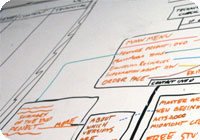Secondary Schools |
Money Education Project
Research has revealed that over half of UK teenagers have been in debt by the time they are 17. Around 15 per cent of 18 to 24- year-olds think an individual savings account (ISA) is an iPod accessory, and one in 10 reckon it's an energy drink.
We look to go nationwide with this project with the potential of reaching 1.7m children between the age of 14-16 and a further 500,000 between the age of 16-18. We will also provide material and literature for parents and teachers which could potentially impact a total of 5m individuals. With money problems accounting for so many social problems in the UK we feel that the current economic downturn means that it is even more important than ever to educate our future generation about money management.

Our project is not only innovative due to our concept of money management and budgeting for young people but we also tailor and adapt our bespoke class room sessions to different demographics and age ranges to help engage all of our audiences. We can do this because we have one to one interaction with all of our audiences which helps us to efficiently make use of all of our feedback and responses. This helps us to deliver unique and fun seminars and workshops. We hope that we will be able to one day become the benchmark or even the accreditors for financial capability and literacy in schools through out the UK.
In year 1 we will cover London - secondary schools, six-forms and community groups. Year 2 we will double the number of London beneficiaries and cover select disadvantaged areas in England. Year 3 we will go nationwide. We plan to make the expansion and improvement of our services an on-going process. It will be funded by our on-going and ever-growing supporters, funders and donors. Additionally it will be financially supported by our learning and teaching materials and potentially an on-line support package for the schools.

With our scalability being nationwide we feel it is essential that we leave our mark on each school, six-form and community group. That is why we will give out flexible teaching materials so teachers can adapt our workshops and seminars to fit into subjects such and maths, business studies etc. We want to help teachers and the government find practical ways of implementing financial capability into the new citizenship curriculum. We are told by both government bodies and teachers that this is a particularly problematic unit to teach due to a distinct lack of focus and direction in the course outline.








